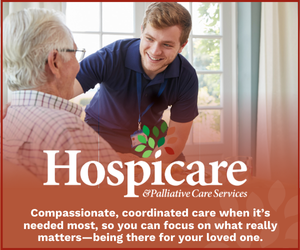(607NewsNow) — According to the National Institute of Aging, palliative and hospice care “both focus on the comfort, care, and quality of life of individuals with serious illnesses”. Hospice care focuses more specifically on the end of someone’s life and being able to provide as best a quality of life as possible.
For a hospice care nurse, being trusted to ensure care and comfort toward the end of a patient’s life is not something they take lightly. Annette Slack Moehrle, a nurse for Hospicare who sees patients in their homes in Cortland County, says not every day is the same when working in hospice and palliative care, but they do start the same.
“Usually, I preschedule on Mondays to plan for the week ahead and make sure I can spend at least an hour with each patient I see, which is typically 3 to 4 a day. After meeting with my bosses and primary nurses to see what happened overnight, I assess my patient’s overall wellbeing and sometimes collaborate with their other care providers, monitor their pain, eating, sleeping, vitals, review their meds, and any wounds they may have. A head-to-toe assessment of each patient is how I start the process of getting the full picture of where they’re at,” says Moehrle.
Seeing each patient in their home means getting to know them in the environment where they’re most comfortable, enabling Annette to form close relationships with them.
“Being able to meet people where they’re at health wise and location wise means really getting to know that person, which makes it harder when they do pass. Working in this field, you leave a little piece of your heart everywhere you go. When helping a patient, you have to be their rock because they’re relying on you. Helping people in such a vulnerable time of their life is very emotional and at times very difficult, but if it was something I knew I could’ve done sooner, I would have,” she says.
Zach Lewis, a resident hospice care nurse, echoes the same sentiment. Working 12 hours shifts at the Hospicare residence in Ithaca that has 6 beds, it’s small enough to have ample time to form meaningful relationships with patients.
“Having started as a NICU (Neonatal Intensive Care Unit) nurse, switching from preserving life at all costs to making sure that your patients are as comfortable as possible at the end of theirs was a real change of pace. Birth and death are the two biggest transitions in our lives and being able to sit with someone who doesn’t know what’s next and is saying they’re scared and telling them ‘You’re scared, I’m scared too, let’s talk about this together’ is a really unique feeling,” says Lewis.
Both Lewis and Moehrle agree that working through grief and the number of emotions stirred up through caring for those who are at the end of their lives doesn’t outweigh how rewarding working in hospice care is.
“People often ask me what the toll of doing this job is, but the truth is that helping people in this way is something I haven’t been able to find in any other type of nursing. Learning when to compartmentalize emotions and when to sit with them and grieve is a skill that I’ve learned on the job that helps me not only in my career, but in life,” says Lewis.
Have more questions about hospice care? Visit the Hospicare website here.




